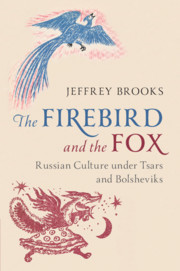Book contents
- Reviews
- The Firebird and the Fox
- The Firebird and the Fox
- Copyright page
- Contents
- Color Plates
- Figures
- Acknowledgments
- Introduction: An Age of Genius
- Part I Emancipation of the Arts (1850–1889)
- Part II Politics and the Arts (1890–1916)
- 6 After Realism
- 7 The Performing Arts
- 8 Celebrity, Humor, and the Avant-Garde
- Part III The Bolshevik Revolution and the Arts (1917–1950)
- Epilogue
- Notes
- Index
- Plate Section (PDF Only)
7 - The Performing Arts
Diaghilev’s Ballets Russes
from Part II - Politics and the Arts (1890–1916)
Published online by Cambridge University Press: 05 October 2019
- Reviews
- The Firebird and the Fox
- The Firebird and the Fox
- Copyright page
- Contents
- Color Plates
- Figures
- Acknowledgments
- Introduction: An Age of Genius
- Part I Emancipation of the Arts (1850–1889)
- Part II Politics and the Arts (1890–1916)
- 6 After Realism
- 7 The Performing Arts
- 8 Celebrity, Humor, and the Avant-Garde
- Part III The Bolshevik Revolution and the Arts (1917–1950)
- Epilogue
- Notes
- Index
- Plate Section (PDF Only)
Summary
While artists and writers within the empire were asserting their freedom and power as artists, arts impresario Sergei Diaghilev (1872-1929) and his associates were doing so abroad. Their innovative mix of music, art, and dance in Firebird (1910) and Petrushka (1911) changed ballet forever. In the glow of fame, Diaghilev and composer Igor Stravinsky (1882-1971) went still further in The Rite of Spring (1913), the succès de scandale of which added to their glory and their impact. That many in their elite foreign audiences had political and economic stakes in tsarist Russia and were predisposed to welcome all things Russian does not diminish the artistic accomplishments of the Ballets Russes. Its creators advanced Russia’s national cultural identity, further repositioning art and artists in relation to the autocracy. Although the Ballets Russes affected indifference to the political content of their works, Diaghilev’s finances were highly politicized from the beginning. Furthermore, in Rite the creative team depicted a shocking denigration of women’s agency and a fantasy that appealed to Russia’s contemporary extreme right (although it was not performed in Russia); that of an ancestral Slavic culture at once patriarchal, ethnically pure, and notably free of Jews, Poles, Ukrainians, and other minorities.
Keywords
- Type
- Chapter
- Information
- The Firebird and the FoxRussian Culture under Tsars and Bolsheviks, pp. 125 - 146Publisher: Cambridge University PressPrint publication year: 2019

